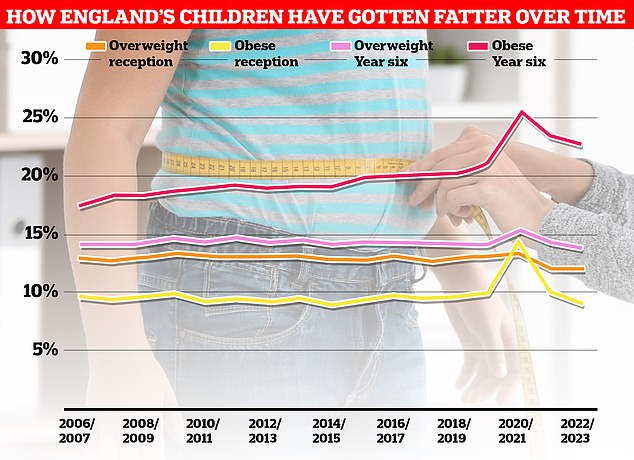Overweight kids are less intelligent as their slimmer peers, controversial research today suggested.
Scientists in the US, who tracked more than 5,000 nine to 11-year-olds, found pupils with a higher body mass index (BMI) performed worse in tests.
And they were also more likely to have symptoms of depression, researchers said.
But it is not clear if a poor diet harmed brain development or if an under-developed brain caused over-eating.
Experts have long warned a ‘quick fix environment’ combining unhealthy diets with increasingly sedentary lifestyles have caused problems in the way children develop.
Previous studies have also suggested BMI is associated with alterations in the brain’s prefrontal cortex development. Deficits in working memory may contribute to poor dietary decisions.
The researchers from Washington University in St Louis, Missouri assessed data from more than 2,500 girls and 2,700 boys between 2016 and 2018.
Over a follow-up of two years they discovered kids who scored one point lower on picture and vocabulary tasks had a higher BMI of 0.012 (1.6 per cent) on average.
Children classed as overweight or obese — who had a BMI above the 85th percentile — were almost twice as likely to have ‘more problems annually than those with normal weight’, scientists said.
Writing in the journal JAMA Pediatrics, researchers said the findings highlight the ‘importance of cognitive and mental health’ to weight gain.
They also called on clinicians to monitor children who are overweight or obese ‘for increased depression problems’.
Future research could explore why this is the case and why some do not adhere to a healthy diet or lifestyle.
Experts have long warned that changes to kids diets and a lack of physical activity have created ‘the perfect storm’ in hindering child development.
Professor Iain Buchan, a public health expert from the University of Liverpool, told MailOnline: ‘If you look at the change in our energy balance, the way we eat, what we eat, the way we move around and relate to each other, all these things have changed dramatically in the last 20 years.
‘Although we are more connected we are also more sedentary as everything is done sitting down, online, or fixed to a device.
‘Our bodies didn’t evolve to spend so little energy. We need to move around and interact physically and spend time disconnected in order to reflect.’
He added: ‘Life has become so different in terms of pace and food has changed too: we now have unhealthy diets, with high fat, high salt and high sugar junk foods that provide rapid energy, and that’s not good for health.
‘We have created a quick fix environment that’s all about short term pleasure and it’s causing long-term pain.
‘It’s the perfect storm, to combine that with being fixed to the spot and a lack of physical interaction — all of these things are causing problems with the way children develop. It’s not what our bodies have evolved to do.
‘These problems have been baked into a generation and we’re now seeing the effects of that.
‘We see a rise in mental health problems, obesity and other diseases, and drug use.’
The pressures of modern life have long been blamed for contributing to what is being widely described as a ‘crisis’ in children’s mental health.


Over a million children had their height and weight measured under the National Child Measurement Programme (NCMP). Nationally, the rate among children in Year 6 stands at over a third, despite having fallen slightly since Covid began


Among Year 6 pupils, national obesity fell from 23.4 per cent in 2021/22 to 22.7 per cent. Meanwhile, the proportion of children deemed either overweight or obese also dipped, from 37.8 per cent to 36.6. Both measures are above pre-pandemic levels
Nearly a quarter of children in England now have a ‘probable mental disorder’, according to a report from the Office of National Statistics (ONS).
The rate of these disorders, recorded based on answers from a questionnaire of eight to 16-year-olds, is on the increase.
Data for 2023 suggested 23.3 per cent of children had a probable mental disorder, such as anxiety or depression, up from 19 per cent the year prior.
Experts have also previously highlighted the impact of the Covid pandemic, and the disruption it caused to children’s education and social lives, alongside the cost-of-living crisis and social media as damaging kids’ mental wellbeing.
Latest childhood obesity data for England also shows one in 10 children are too fat by the time they start primary school, rising to about one in four among Year 6.
Obesity takes a massive financial toll in the UK, with the resulting health consequences on loss working years, care costs, and price of NHS treatment costing the economy an estimated £100billion per year.
Experts have pointed to a lack of exercise, and poor diets high in ultra-processed food, as being key drivers in the UK’s childhood obesity epidemic.
Source: Mail Online






